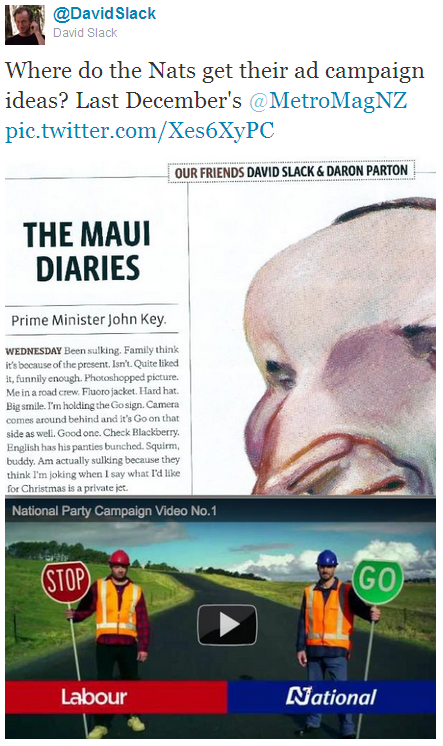
Eugenics
ACT’s brand new deputy leader, Beth Houlbrooke, is into eugenics.
That’s what’s behind her emergence from the dusty old crypt of “if you can’t afford children, don’t breed” this week. I called it eugenics because when you use welfare to restrict fertility you’re targeting people who are overrepresented among welfare recipients, which in Aotearoa means you’re targeting MÄori and Pasifika people. I was not alone.
And what happens when these benefit cuts produce increased rates of hunger, homelessness, sickness, neglect, and abuse among those families? Well, the government’s brand-new Ministry for Vulnerable Children will take them away from their parents. Welcome to your first glimpse of Aotearoa’s next stolen generation, just days after the government refused to consider redress for the last generation of children abused in state care.
Act: too many children born into poverty
Me: So you're going to eradicate poverty? cool
Act: No we're going to eradicate children#nzpol— WhakarauJK (@ArrestJK) July 12, 2017
Does this all seem a bit of a stretch? Well, we know what government-mandated child welfare agencies do when they decide parents are not doing well enough: they “manage” those parents. This is explicit in the ACT policy:
ACT WILL:
- Push for a life-time limit of five years for support under the Sole Parent Support programme, and a life-time limit of three years for support under the Jobseekers Benefit, with “income management†being applied to beneficiaries when those limits are reached.
- Extend income management to any parent who has additional children while on a benefit.
We know what happens when governments micromanage welfare: people find it a bit harder to buy smokes and booze, sure, but they also are forced to shop at a limited range of expensive outlets, they can’t buy cheap healthy produce at markets, they can’t barter or pay cash, and they are incentivised to game the system rather than working within it. The ACT Party hates perverse incentives, but not this one. And in Australia, it costs a fortune to administer. It would literally be cheaper to give each NT recipient an extra $100 per week than to give them a Basics Card. And we know what the ultimate government sanction is for “bad” parents: the removal of children from their custody. Draw your own conclusions.
As to eugenics. ACT leader David Seymour’s press secretary helpfully confirmed this aspect when he compared the ACT policy to abortion, which has the distinction of being the leading eugenic technique currently in use worldwide (largely for sex-selection). I gave him several opportunities to walk it back but he bravely refused them.
I think if you're interested in considering policy effects retroactively, you have to make that comparison.
— Louis Houlbrooke (@louishoulbrooke) July 13, 2017
Read the whole thread, and draw your own conclusions. (And yes. Louis Houlbrooke appears to be Beth’s son. Rumination on the political wisdom of appointing the leader’s press sec’s mum as deputy leader are left as an exercise for the reader.)
This is not just ACT’s bag. That nice man John Key — himself raised on welfare — spoke in 2002 of women “breeding for a business” under Labour’s DPB rules. Current PM Bill English, while he would surely disavow the abortion analogy, was happy to compare welfare recipients to drug addicts. This kind of thinking goes all the way to the top.
Class eugenics
My response to the policy was the sort of fury that educated white dudes don’t usually get in welfare discussions: that’s me they’re talking about! After my father died my mother brought three young kids up on the benefit, and we will never forget that. Attacks on welfare, and especially on welfare mothers, are attacks on us. I had a wee rant about it that you can read if you can stand the swearing.
Dozens of others on twitter did likewise. Some are a bit famous. One is a Member of Parliament. A list put together by The Spinoff of notable children of welfare recipients includes millionaires, war heroes, All Black legends, and no fewer than three Prime Ministers. I was amazed by how many people had grown up on welfare and yet, somehow, had managed to become productive, decent human beings. I shouldn’t be, but there you go: that’s how deep anti-welfare stigma goes. Few of us in Aotearoa are many generations from being dirt poor, and it would pay us to remember that and not be ashamed of it.
Poor broke guy and his poor broke girlfriend went ahead and had this baby and two more and ended up being the best parents IN THE UNIVERSE! pic.twitter.com/UGNyDcTZvU
— Marama Davidson (@MaramaDavidson) July 13, 2017
The fact that so many people not only benefited from welfare, but understand its continuing importance in the age of busted unions, stagnant wage growth, casualisation, and the “gig economy” represents a threat to parties like ACT and National. The social purpose of the welfare is to support people out of poverty and into work and prosperity. It is a system that creates and nourishes the working class, and prevents the worst excesses of capitalism from destroying workers. And it works.
So of course the right-wing want rid of it. They can’t erase welfare kids from my generation, but in terms of long-term strategy, preventing today’s generation of poor people from having kids like us probably seems a pretty sound way to destroy class consciousness.
The way this breaks down illustrates how class politics is not distinct from but a necessary adjunct to identity politics in leftwing praxis. On paper I am pretty middle class, but this is temporary. Few of us welfare kids ever forget how little it takes to fall into economic uncertainty, so culturally, I will always be working class. Purists might bridle at this as just another identity, and some will continue to deride me as a bourgeois liberal managerialist, but I know where I came from.
This is how identity politics intersects with class politics. The same factors which make ACT’s intended victims — young, poor, brown women — vulnerable to this policy means they also stand to benefit most from Labour’s Families Package and Best Start policies, which provoked Houlbrooke’s statement in the first place. So bringing class and identity politics together, even if it was inadvertent, is good: it is brave policy, directly targeting people who already suffer from a lack of equitable access to the political and economic system. And those of us who remember what it was like to be brought up on the benefit, who now enjoy the privileges of a middle-class life and access to the political system, can show solidarity. We must show solidarity. Doing otherwise would be a betrayal of our ancestors.
The lack of a robust response to ACT’s latest attack on poor people from Labour is disappointing. It has largely been left to people on social media to fight the fight, and to my knowledge nobody in the party has used the e word. This is perhaps understandable in light of the party’s own history of man-on-the-roof welfare-bashing, and, you know, I grew up on that benefit under Rogernomics. They’re not blameless on this stuff. But let’s not be churlish. While Labour in 2017 might not be ideal, at least they’re not trying to breed poor people out of existence.



